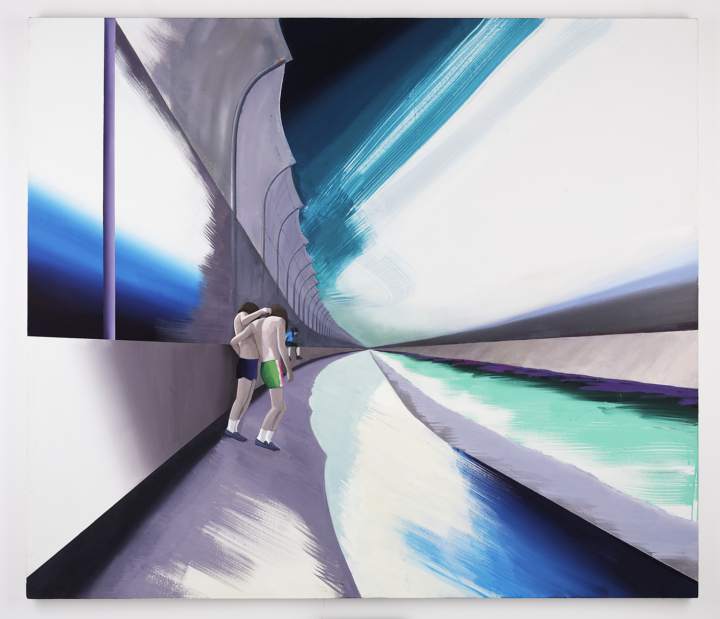It skulked within the sky: deterioration. Lightning skewered our chat; every rupture lacerated the clouds in thunderclaps like disembodied, stroboscopic sniggers. The sky purred, tightening into sultry accumulations ceding to tremors. Rainfall plundered clarity like a blunted contour. Macerating matter became slushy in the gutters; plashes multiplied in the slurry of it all. Sopping, delight shivered over us; the privilege of stable observation afforded us the dumb pleasure of being mere witnesses to the sky dissevering itself.
This was only London; it blew over, largely traceless. The minor outbreak was only ever the whisper of jeopardy, an evanescent threat that allowed us to treat the storm as a novelty. Its impression demonstrates how the apocalyptic has become a blockbuster aesthetic, disaster as mere entertainment for those who have the luxury to purchase its ticket, disaster as a specious, probably italicized term among millennials. Andrew Durbin introduces the disaster imaginary in the beginning of his debut novel MacArthur Park, starting in 2012 with the arrival of Hurricane Sandy in New York, where the protagonist, Nick Fowler (a poet and writer), is housesitting for an art collector in the West Village. Its aftermath haunts Nick, who decides to visit the bedrock of ecological trauma: Miami. The essay functions as a preface to Nick’s larger project on the weather.
Nick soon returns to New York and his affectless milieu; he meets Simon, a lover who later becomes a cipher. Together they watch the sunrise over Lower Manhattan, but the weather lacks coherency: “It might have been snowing. All winter I kept thinking that it was snowing, though it was often too warm to stick or seemingly too cold to snow… The weather did not like to make itself understood.” Crisis, much like the weather, gives one shape, but its edges lack definition. MacArthur Park reads like an extraterritorial landscaping of this porous feeling: both eminently real and deceptive, realized in a meta-narrative that saunters and drifts with sleeper-like breadth. Crises challenge collective and individual memory, betraying Nick’s conviction as he recollects the first scene as mere fabrication: “Had my mind added that bit later, to place myself among accountable things since I was otherwise left in the abstract space of someone else’s apartment, just at the edge of disaster? I could have said anything about my past.” Durbin’s reiteration attempts to reinforce his place in the present — much like “everyone wants to be an artist because everyone wants to speak about the now” — but ultimately his precision lies with periphrasis.
This also lends Durbin’s tone a leisurely quality that quivers with subliminal anxiety: he analyzes his characters and interactions to extreme crystallinity even when Nick’s “untitled book thing” folder on his computer, and the travels made in pursuit of its realization, elude him. We get closer: “I wanted to write about what the weather made people do — and the weather of what people did. Weather as politics, weather as history.” The weather of places and psyches, of private and public histories, highlights the discrepancy between the representation of a place and the place itself. Such representations manifest desires for self-inscription, a catalogue of self-portraits, and can merely cruise the façade to pamper aspiration; Durbin’s research into fanatics such as Aleister Crowley and Aimee Semple McPherson, however, are rich accounts of other kinds of mythmaking, and here they serve as historical aids rather than propulsions for plot.
Nick travels to a troubled art commune, the Tom of Finland Foundation, the Madonna Inn, the Fire Island Pines, Hampstead Heath, California, Vienna, and New York. In his latter travels across Europe, a fresh social vulnerability surfaces, replacing disaster with the brutal organization of public spaces, and how private desires are negotiated in such spaces. Throughout, Durbin’s attention rests on the surface, swirling inward with Nick’s interior monologue. Information also arrives spontaneously, in block quotes and index-style lists. The research can be so digressive, its connection to the core narrative so subtle as to appear a blissful stray that dodges assessment of genuine narrative influence; when this research floats it incites the desire to return to Nick’s actual purview.
As for the novel’s namesake, Durbin conspicuously elides the actual palm-tree-bordered lake of downtown Los Angeles in favor of Donna Summer’s disco rework of Richard Harris’s saccharine ballad. “Disco performed travel for me,” Durbin writes, and Summer’s refrain takes him further:
MacArthur Park is melting in the dark
All the sweet green icing, flowing down
Someone left the cake out in the rain
I don’t think that I can take it
‘Cause it took so long to bake it
And I’ll never have that recipe again.
In this liquid mode of metaphor I’m reminded of Durbin’s collection of poetry-cum-cultural-critique in Mature Themes and its extrovert glitter tactics, hot and feverish. MacArthur Park is smoother, attenuated to Nick’s persistent, self-reflexive welding of form and narrative arc. But it retains a glimmer of Mature Themes’ effervescence, that is, a recipe of frictions: destruction, disorientation, hallucination, criticism, its coalescence into a novel, a deckled bildungsroman, a recipe lacking template, the well malformed. In this way, Durbin’s approach to form and structure recalls the 1970’s New Narrative movement, as exemplified by Robert Glück. Durbin’s arc comes back to the park, to California, as “the end of an arc constructed over the dead who resisted it,” back to the molten baked blunderbuss: “As soft architecture, it isn’t built to last, rain comes through; the party forgets it as they head for shelter, and so it begins to break apart in the storm … The cake is a theory for cake that proves that cake doesn’t last.”
Nick: “The issue at hand was my own inarticulate desire to know a place I didn’t live in, the intimacy I wanted to produce out of visiting it, specifically in writing.” Admittedly cloistered, soft with glamour and dense with fascination, this issue nevertheless delivers slick exchange between reader and novel, even as his subject slips “out of sight, into my own spiraling digressions.” A carousel whose loops unfurl into hard-cut occult histories, to goofed attempts at astral projection, to impassioned delirium in The Spectrum, to organize the anxiety of the extremity while the cake continues to melt.



